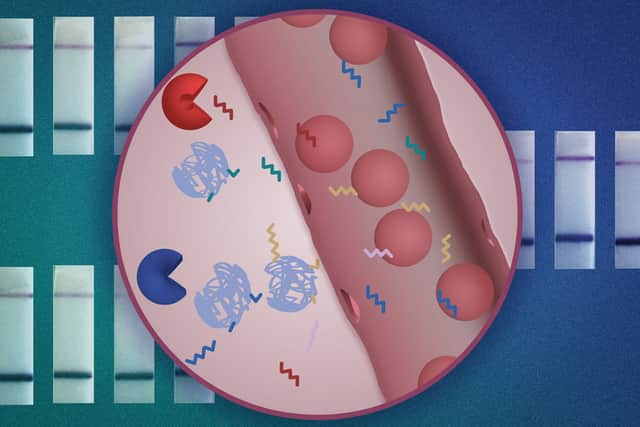Cancer could soon be self-diagnosed through simple urine test - designed to be affordable and accessible
and live on Freeview channel 276
Cancer could soon be self-diagnosed through a simple urine test which is designed to be both affordable and accessible to all.
American researchers have created a new nanoparticle sensor, which works the same as pregnancy tests, to quickly and cheaply diagnose cancer.
Advertisement
Hide AdAdvertisement
Hide AdThe sensors can detect cancerous proteins and could even be used to distinguish between different types of cancer and evaluate whether tumours are recurring after treatment.
The nanoparticles are designed to find tumours and emit DNA sequences when they do, which are then detectable in urine.
Engineers from the Massachusetts Institute of Technology (MIT) designed the nanoparticle sensor which can detect various cancerous proteins.
The nanoparticles are designed so that, once they encounter a tumour, they shed short sequences of DNA which are later excreted in the urine.
Advertisement
Hide AdAdvertisement
Hide Ad

Analysing these DNA ‘barcodes’ from the urine can reveal distinguishing features of a patient’s tumours.
Initial tests in mice demonstrated sensors could be used to detect the activity of five different enzymes expressed in tumours, and it is likely trials will be soon carried out in humans.
The MIT research team designed their test to be performed on a strip of paper, similar to a pregnancy test or lateral-flow Covid test, to keep it affordable.
Dr Sangeeta Bhatia, a biological engineer and a professor at MIT’s Institute for Medical Engineering and Science and Electrical Engineering and Computer Science (EECS), said: "Putting this diagnostic on paper is part of our goal of democratising diagnostics and creating inexpensive technologies that can give you a fast answer at the point of care."
Advertisement
Hide AdAdvertisement
Hide AdFor some years now, Dr Bhatia’s lab has been developing ‘synthetic biomarkers’ which could be used to diagnose cancer.
The naturally-occurring biomarkers are so rare, especially during the early stages of cancer, that they’re nearly impossible to find.
However, synthetic biomarkers can be used to amplify these small-scale changes occurring within small tumours.
In her previous work, Dr Bhatia created nanoparticles which can detect the activity of enzymes called ‘proteases’ - which help cancer cells escape their original locations or settle in new ones.
Advertisement
Hide AdAdvertisement
Hide AdThese nanoparticles are coated with peptides that are split by different proteases and, once released into the bloodstream, these peptides can then be concentrated and more easily detected in a urine sample.
The original peptide biomarkers were designed to be detected based on small variations in their masses, using a mass spectrometer - but this kind of equipment is likely not to be available in lower-resource settings.
So researchers instead developed sensors which can be analysed more easily and affordably using DNA barcodes read using a specially-designed technology called ‘CRISPR’.
For future human use, the researchers expect they may need to use more than five barcodes as they did in the mice, due to the variety in patients’ tumours.
Advertisement
Hide AdAdvertisement
Hide AdTowards this end, the researchers teamed up with scientists at the Broad Institute of MIT and Harvard to create a microfluidic chip which can be used to read up to 46 different barcodes from just one sample.
This kind of testing could be used not only for detecting cancer but also for measuring how well a patient’s tumour responds to treatment and whether it has recurred after treatment.
The researchers are now working on further developing the particles with the goal of testing them in humans.
Comment Guidelines
National World encourages reader discussion on our stories. User feedback, insights and back-and-forth exchanges add a rich layer of context to reporting. Please review our Community Guidelines before commenting.
